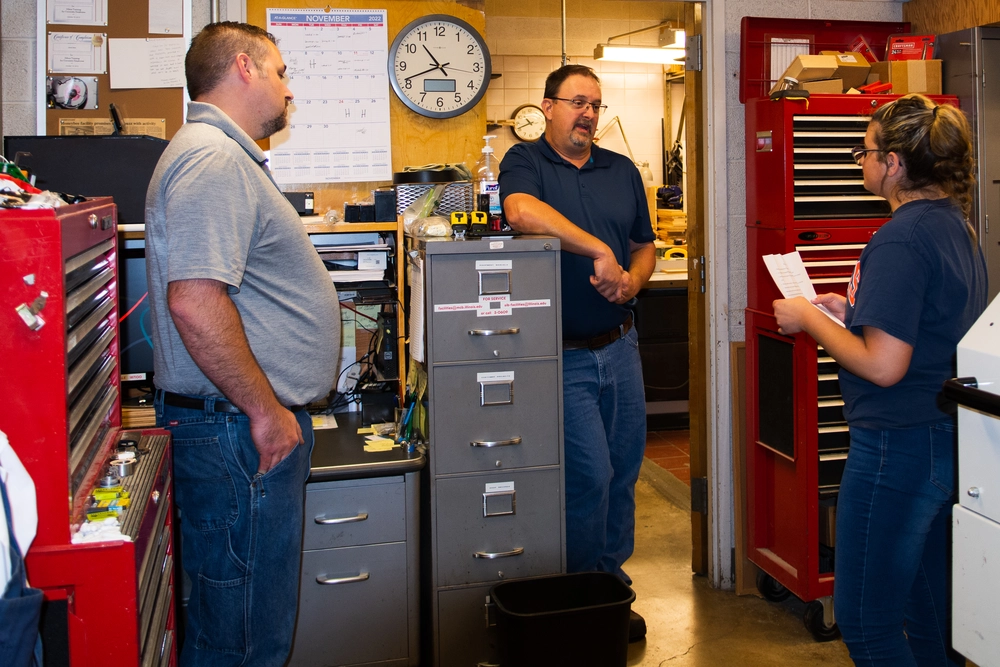
To get a sense of the scope of Scott Baker and Jared Bear’s impact, check out the world map at the entrance to the machine shop and the push pins scattered around the globe. From Antarctica to Urbana-Champaign, they’ve worked on small-scale projects (think fruit flies) to large-scale projects (more on iguanas, later) that have benefitted faculty and students.
We recently toured their shop, located in the lower level of Burrill Hall, and chatted with Scott and Jared about the work they do for faculty, staff, and students in the School of Molecular & Cellular Biology and the School of Integrative Biology. When it comes to fixing, repairing, and creating equipment, Scott and Jared are there to help. Scott serves as the Research Laboratory Shop Supervisor and Jared is an Instrument Maker. They both work together in solving the school’s equipment issues and requests.
MCB: What is the Life Sciences Machine Shop and what do you do there? What makes the shop unique?
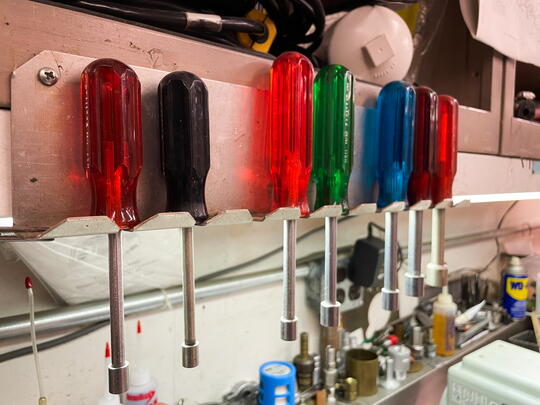
Scott Baker: Our primary goal is to help the faculty members, staff, and students in the Schools of MCB and SIB with projects, repairing equipment for their experiments, and lab projects. We also take care of prep room equipment: autoclaves, dishwashers, glassware, drying ovens, and ice machines. We are the point of contact for refrigeration issues within the schools. Once we get those requests, we’ll go take a look and see what the issue is and direct it to the proper channels to get the problems taken care of.
Scott: Each of the [units on campus] that have [machine shops] are unique to their own group. We’re unique because we sometimes know what our clients and our customers need. Whether we’ve made something similar to what [researchers] need from the past, we can somewhat envision what they need. We have been here awhile.
Jared: We’ve heard from newer faculty who come [to UIUC] that they’re blown away that they have access to a facility like this and people like Scott and me. They have come from other universities that don’t have a machine shop to make things work and they had to buy everything, which can be expensive. Depending on the item, sometimes we can make things at a more affordable price.
MCB: How long have you been with the machine shop and what drove you to work for UIUC?
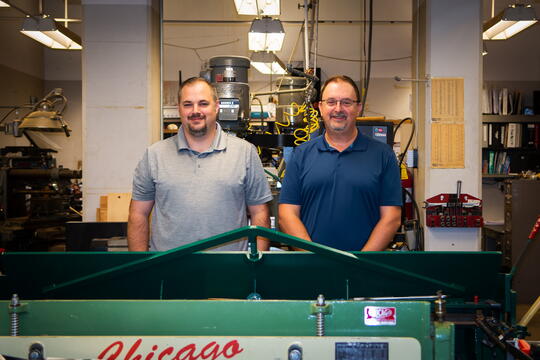
Scott: I have been in this shop for 34 years now. I had a love for machining after I took it in high school … I love helping people so working here, helping students, professors, and staff with their projects is what I enjoy.
Jared: I have worked here for almost 12 years now. I have been in the profession for almost 20 years. What drew me to a university was getting to work with a diverse clientele and the opportunity to help people with their research as well as receiving the benefits being at the university offers.
MCB: What would you say is the most exciting part of your job?
Jared: Getting to create projects that will help people succeed in their research. Whether that be the professor’s research or a student’s education where they can use something we made to help them graduate.
Scott: When we work with students or faculty and we’re able to help them make their projects successful and they let us know, that’s very exciting for us. It’s what keeps you wanting to do this over and over again.
MCB: Looking back on all the equipment and projects you’ve made, what are some of the coolest things you’ve worked on?
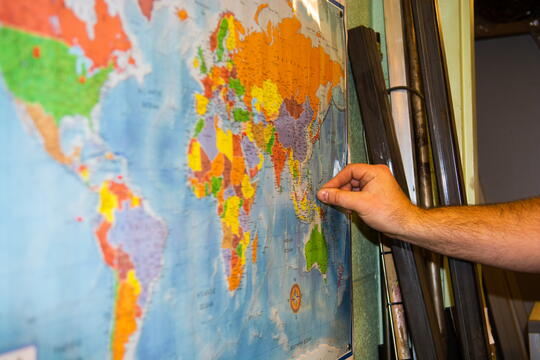
Scott: Several years ago, I made a treadmill for a Galapagos iguana. The faculty member captured the iguanas and put them on the treadmill to do their research. I was watching Discovery Channel one night and I saw the professor on there with the equipment that I had made. That was really cool. The treadmill basically ran off a generator because that’s what they had on their boat. It was portable and most of it was collapsible.
Jared: I think the neatest thing is that we make things for so many people and they’re spread out across the world now. Recently, we put a world map up [in the shop] to put pins where everything is at. We’ve got our crystal freezer down in Antarctica, Scott had that treadmill go to the Galapagos, and we just sent a collapsible fog collector to the Galapagos a few months ago. We also sent a vapor collector to Palau.
I’ve made a vacuum seeder for tobacco plants that would seed an entire tray. I’ve made an apparatus to hold different talons and stingray spines and fangs for puncture research. Scott made hydro flow chambers, which are similar to wind tunnels except the water cycles through chambers. It’s stuff like that where somebody comes to us with an idea of, “Hey, I really want to do this project.’ We’ll sit down, figure it out, play with the ideas, draw things up, and confer with people. Then we design the project from scratch. We’ve done big things to small things. We put large spikes on some new John Deere tractors to help with an issue a researcher was having with a coring project. In our small projects, I have made something to hold down the brain of a fruit fly on a slide.
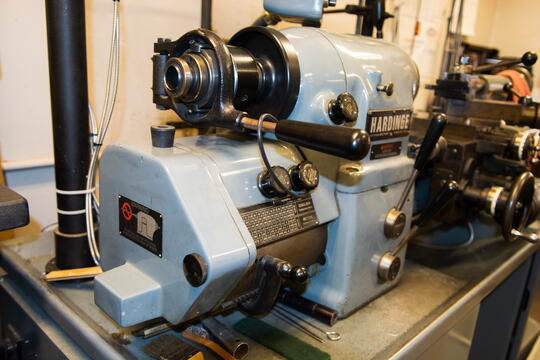
Scott: We don’t typically think inside the ordinary box. We get to think outside of the box to do what we need to do and that’s fun.
Jared: If we can’t make something [from scratch] that is cost-effective in the shop, we will ask ourselves if there’s something available that we can buy and then modify. Scott made mouse or bat boxes by modifying mini-fridges.
MCB: When not in the shop, what do you like to do for fun?
Scott: Any kind of motorsports racing is fun to me. I enjoy baseball and football. Being outdoors, fishing, hiking, and just being outside. The machine shop is in the basement (of Burrill Hall) so I like to be outside when I’m not at work.
Jared: “I like woodworking at home and turning projects on a wood lathe. My family is also big into Lego building. Working with our hands, and following a blueprint or instructions goes hand-in-hand with what we do here [in the machine shop]. I want to teach my daughters so they can build a toy to play with versus having to buy something that’s already made.